The 2022 FIFA World Cup in Qatar is the most controversial in the tournament’s history, with the location and the timing of the tournament presenting challenges for brands as well as the participants.
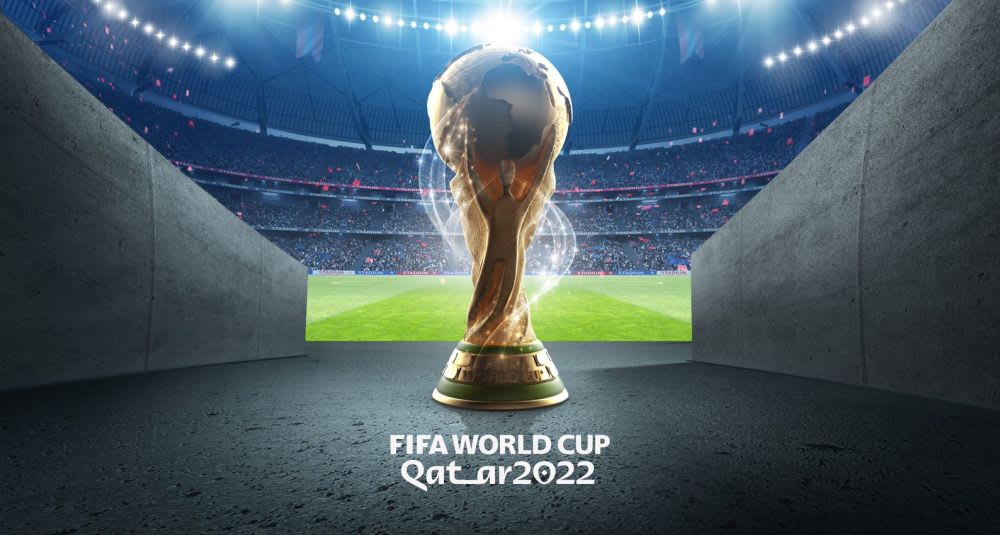
The FIFA World Cup, with the promise of a month of football action involving the world’s top 32 national teams and superstar players competing for the biggest prize in sport, is customarily one of the most highly-anticipated events on the quadrennial calendar, attracting a huge global audience, and prominent brands and media outlets eager to tap into the fervour.
Major companies that have paid millions to associate themselves with the tournament include Adidas, Coca-Cola, Visa, Budweiser and McDonald’s.
However, the build-up to the 2022 World Cup, which runs from 20 November to 18 December, has been a break from the norm in many ways. For a start, it is taking place in Qatar, a small Gulf state with little football heritage that has not previously qualified for, let alone hosted, the iconic tournament.
Moreover, the hot summer temperatures in excess of 40 degrees Celsius in the Middle East prompted FIFA, with the co-operation of the hosts, to move the event from its traditional dates in June and July to the northern hemisphere winter.
This is the first time the World Cup is being held at the back end of the year, and the switch has forced a seismic shake-up of the football timetable for 2022/23, with the top European leagues, including England’s Premier League, having to take a protracted break as top stars are whisked away by their national teams.
There are also significant wider implications, with the tournament taking place close to Christmas when broadcasters and advertisers have other pressing scheduling and spending commitments.
Timeline of controversy
Qatar, a country of just 2.8 million people, was awarded the World Cup back in 2010 in a controversial FIFA vote that also saw the 2018 event granted to Russia, and has since been the subject of lingering allegations of corruption. However, the two countries have always denied any wrongdoing, and a probe by the governing body, itself no stranger to scandal, cleared them and allowed the hosting decisions to stand.
The lack of pre-existing facilities in Qatar has necessitated a massive construction spree in the oil-rich country, with an estimated $200bn (£168bn) spent on building seven new stadiums and upgrading one other, all in or close to the capital Doha, that will stage the 64 matches, and putting in place supporting infrastructure.
This too has been a contentious process given concerns over the treatment of migrant workers in the country, with reforms to the kafala system that tied them to employers failing to fully satisfy campaigners, and a Guardian report last year claiming 6,750 south Asian workers had lost their lives on all construction projects since Qatar was awarded the World Cup.
Just this week, Amnesty International and a coalition of other organisations called on FIFA to set aside $440m, equivalent to the tournament prize money fund, to support migrant workers and compensate those who have been injured or the families of those who have died in Qatar.
In addition, the country continues to be a target for criticism over other aspects of its human rights record, notably towards the LGBT+ community, with homosexuality illegal and even punishable by death.
While none of the qualifying teams threatened to withdraw, various national associations have expressed disquiet over the situation in Qatar, and their right to speak out on human rights there, dismissing a recent letter from FIFA president Gianni Infantino that urged them to “focus on the football”.
The local organisers have insisted that everyone is welcome to attend the World Cup, but the aforementioned issues coupled with the lack of tourism history, the shortage and high price of accommodation and limited access to alcohol means that the number of travelling fans is likely to be well down on previous events, resulting in a more local than global flavour.
Last week, Sepp Blatter, the president of FIFA when Qatar was chosen to host the World Cup, added to the sense of malaise over the tournament by claiming the award had been a “mistake” because of the small size of the country.
Meanwhile, it was notable that, in launching a trailer for its World Cup coverage, the BBC, which shares live rights with the ITV, did not even mention the hosts, instead focusing on how the event commands the UK’s attention, while presenters including Gary Lineker have pledged that the presentation will take in issues beyond the football.
The location, the associated controversies and the timing of the tournament have made it a challenging one for brands that would usually be eager to activate around a global sporting event.
However, despite the negativity, the World Cup remains a commercial juggernaut, and, with major broadcasting and sponsorship deals having long since been sewn up, FIFA is on target to exceed the $5.4bn in revenue from the 2018 tournament.
The figure will include $1.8bn from marketing sales, and official partners that invested heavily in rights have been promoting their association and rolling out campaigns in the weeks and months leading up to this weekend’s kick-off.
With a largely favourable time zone, FIFA expects that a record of more than 5 billion viewers will tune in for the World Cup and in the UK, with both England and Wales having qualified, the latter for the first time for the 64 years, reservations about the tournament are likely to be put on the backburner as fans gather around their television sets for what remains one of the last examples of appointment viewing.
Advertisers are also ready and primed, with a unique opportunity to integrate a major football event into their important festive campaigns.
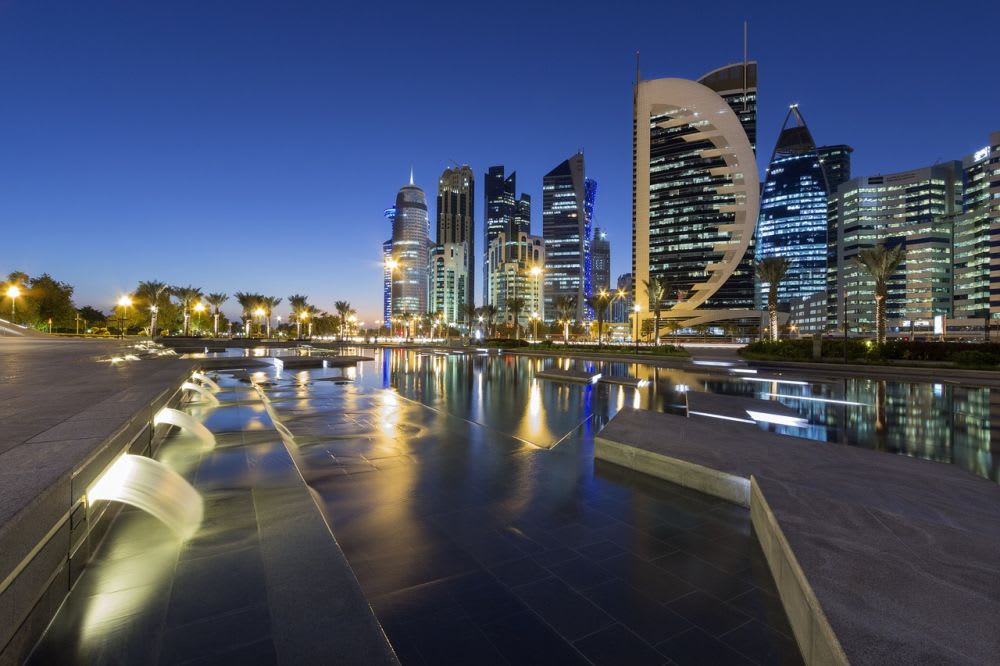
Elite partners
The sponsorship structure for the World Cup comprises top-tier FIFA Partners, which have rights to multiple global events, second-tier FIFA World Cup Sponsors, which focus on one competition, and third-tier Regional Supporters, which have deals for specific parts of the world.
The partnerships entail differing levels of branding and inventory, including LED display advertising at matches, ensuring a significant level of exposure over the duration of the tournament, and some of the companies have associations with FIFA dating back decades.
Given the small size of the Qatari market, the controversies surrounding the tournament and the international footprint of the World Cup, many of the 2022 activation campaigns have a distinctly global outlook and focus on how fans will be enjoying the tournament from afar.
The seven FIFA Partners, which pay around $100m over a four-year cycle, include adidas, which has been supplying the official match ball for the World Cup since 1970, and is already committed to international events through 2030.
The German sportswear giant has tended to differ from its rivals Nike and Puma in seeking official associations with major competitions, which is also exemplified by its established partnerships with UEFA for the Champions League and European Championships.
For the 2022 World Cup, adidas has launched the latest chapter of its ‘Impossible is Nothing’ campaign, which seeks to celebrate how the joy of football unifies players and fans across the globe.
It has kicked off with 'The Family Reunion' film produced by TBWA, which features top players including Lionel Messi (Argentina), Karim Benzema (France), Jude Bellingham (England), Pedri (Spain) and Son Heung-Min (South Korea) alongside British rapper Stormzy embarking on a bus trip to the strains of the Opus song ‘Live is Life’.
Florian Alt, vice-president for global brand comms at adidas, said: “There is a rare moment, once every couple of years, at the beginning of the World Cup when it truly feels like impossible is nothing. A time when players and fans come together united by the belief that they will bring the trophy home.
"During the next month we'll see new players break on to the scene, an underdog beat the odds, unbelievable goals and widespread celebrations taking place across the globe. It's precisely that spirit that our campaign hopes to inspire in fans around the world."
Adidas is also supplying the kits of seven teams at the World Cup, including favoured teams Germany, Spain, Belgium and Argentina, and is engaging with Qatar in creating a fan zone where people can watch the matches live, participate in skills tests, meet football legends and enjoy augmented reality content.
Fellow FIFA Partner Coca-Cola has an association with the governing body dating back to 1974, and has been an official sponsor of the World Cup since 1978 and an advertiser at the tournament since 1950.
Like adidas, it is committed to FIFA until 2030, and its activation for this year’s event has a global outlook, again incorporating the FIFA World Cup Trophy Tour (first held in 2006), which has taken in 51 countries and territories, including those of the 32 participants.
Coca-Cola’s World Cup campaign, which launched at the end of August, has the title ‘Believing In Magic’, coming under the umbrella ‘Real Magic’ brand platform launched in 2021, and features a series of TV films and online videos spanning multiple markets and starting with a 60-second spot called ‘Street’ showing how the world has been preparing for the tournament, and the devotion of fans.
The lead creative agency has been Interpublic’s Mercado McCann, which is based in Buenos Aires in Argentina, and the campaign, which takes in 200 countries, includes films focusing on good luck rituals and traditions such as ‘Bar’ and ‘Family Stadium’ showing fans enjoying Coke at home and in bars while watching the matches.
Coca-Cola has also leveraged its partnership with Panini on excusive World Cup player stickers that are available both digitally and physically under Coca-Cola labels and allow the brand to integrate itself with another element of fandom.
The other FIFA Partners include credit card giant Visa, which has been a worldwide partner of the governing body since 2007, and demonstrated its commitment to the female game by becoming the first official partner of the 2023 FIFA Women’s World Cup in Australia and New Zealand under a new sponsorship structure that comes into effect next year.
The elite line-up for this year’s men’s event also comprises Chinese conglomerate Wanda Group, Korean automotive collaboration Hyundai-Kia and two prominent domestic companies in Qatar Airways and QatarEnergy.
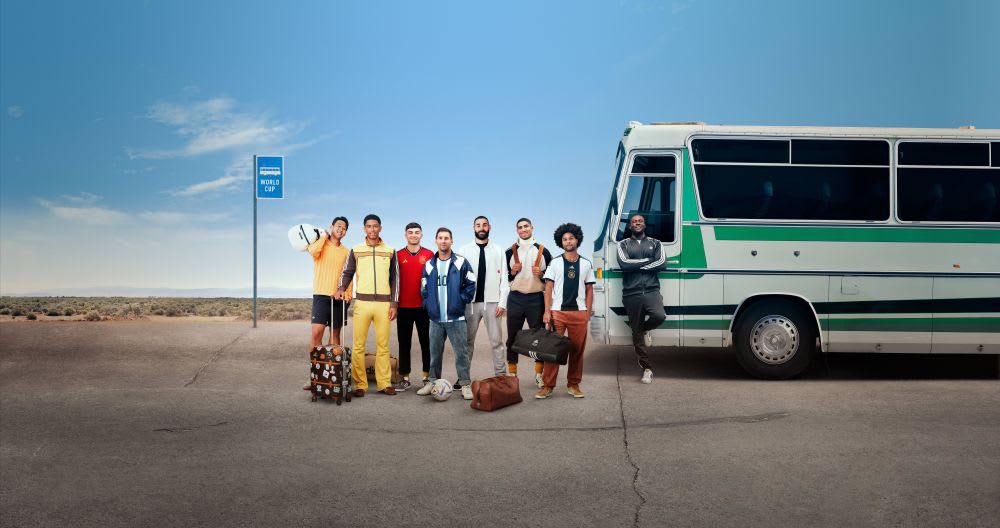
Secondary sponsors
The seven FIFA World Cup Sponsors feature Budweiser, the US beer brand and subsidiary of AB InBev, which has been a sponsor of the tournament since 1985.
For the 2022 event, it has launched its biggest World Cup campaign yet, with activations in more than 70 markets and at 1.2 million pubs, restaurants and retail outlets worldwide.
This reflects in part the limits on its activity in Qatar where the sale of alcohol is restricted, and for this tournament will only be available to supporters in the perimeter areas around stadiums, and at the designated fan zones. Moreover, in recent days, it was reported that Budweiser had been forced to relocate stalls selling beer at the venues as the Qatari rulers wanted alcohol to be less prominent.
Budweiser’s global campaign, entitled ‘The World is Yours to Take’ and developed in partnership with Wieden + Kennedy, kicked off in September and features three top players in Messi, Neymar of Brazil and Raheem Sterling of England, and a film in which they are shown being joined by fans in the tunnel ahead of a match.
Inspired by the campaign, a single of the same name sung by Grammy award-winning artist Lil Baby features on the Official FIFA World Cup Qatar 2022 soundtrack, and will be one of the anthems of the tournament.
Budweiser is also breaking new ground by staging International FIFA Fan Festivals, teaming up with brands Corona and Brahma for events in London, Mexico City, Rio de Janeiro, Sao Paulo, Seoul and Dubai during the World Cup that will complement the main one in Doha’s Al Bidda Park.
“We are passionate about football, and so are our consumers. We are proud to celebrate the sport, the players, and most importantly, the fans of the FIFA World Cup,” said Todd Allen, global vice president of marketing at Budweiser. "We are acting on our purpose of creating a future with more cheers, by tapping into the power of our brands and serving up new ways to make a meaningful impact for our consumers and in our communities."
Another high-profile company in the second tier of sponsors is McDonald’s, which has also launched its largest-ever global campaign for a World Cup, created by Wieden + Kennedy New York, with OMD EMEA handling media planning and buying.
‘Wanna go to McDonald’s’ features Ted Lasso actor Jason Sudeikis, TikTok star Khaby Lamey, Korean pop band ITZY and Twitch streamer Edwin Castro and is intended to emphasise the role that the sport and the fast-food chain play in bringing people together.
The campaign is being rolled out across multiple platforms and is the first time a launch is taking place in 75 markets around the world at the same time.
However, there are also various local activations, including in the UK where players from the England and Wales men’s and women’s teams are encouraging people to sign up to free football sessions, and McDonald’s UK has partnered with food poverty charity FareShare with a commitment to ensure every meal delivered during the tournament is matched with a meal for a family in need.
The global campaign also includes short hero film highlighting the many things shared by fans, which takes in 10 languages and four dialects and was shot in four locations around the world.
While not yet committed to the next World Cup in 2026, the likes of Budweiser and McDonald’s are likely to be eyeing up the greater opportunities presented by that event given that it will be taking place in their home market of USA, with Canada and Mexico as co-hosts.
The other FIFA World Cup sponsors this time round are Indian education technology firm Byju’s, US cryptocurrency platform Crypto.com and three other Chinese companies in electronics and home appliances manufacturer Hisense, smartphone maker Vivo and dairy products giant Mengniu.
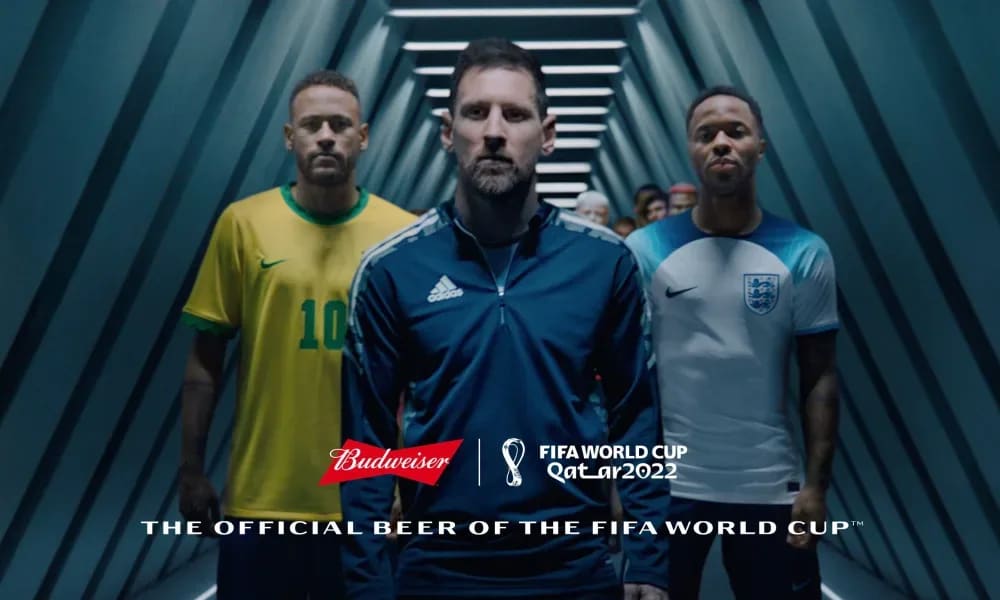
ITV and the home nations
The 2022 World Cup will be a big ratings driver for the UK broadcasters, which are hopeful of strong performances from the participating home nations, especially after ITV drew a peak of 26.5 million viewers for England’s semi-final exit to Croatia in 2018, and the BBC and ITV together pulled in 31 million for the national team’s defeat to Italy in the final of last year’s European Championships.
Advertisers pay up to £500,000 for a 30-second slot in a major England game, and, boosted by the World Cup, on top of Christmas marketing activity, ITV is forecasting year-on-year revenue increases of 3% for November and between 5% and 10% for December.
However, downward pressure on the UK advertising market and the rescheduling of the World Cup to the festive period when brands that might be expected to spend during a summer tournament have already allocated budgets mean that the gains may not be as high as hoped.
In addition, some companies will have been deterred from advertising around the matches so as not to be associated with a tournament in Qatar.
Shares in ITV fell significantly last week after the broadcaster reported a 14% drop in advertising revenue for the third quarter, and a 2% fall for the year to the end of September, and even with a strong final three months of the year, it is still expected to be down by 1% to 1.5% for 2022 as a whole.
Confidence in the England team will also have diminished on the back of poor results in the UEFA Nations League although it is still fourth favourite with the bookmakers, behind Brazil, Argentina and holders France. England is in Group B with Iran, USA and Wales.
England and Wales landed a significant new sponsor this year with Marks & Spencer making a rare foray into professional sport, with the launch of its ‘Eat Well, Play Well’ campaign promoting the diets of footballers to influence families to eat and live healthier.
The multi-year partnership covers all four home nations, and M&S has received further prominent exposure with England and Wales sporting outfits from the brand as they travelled out to Qatar this week.
On the pitch, England will be one of 13 teams wearing Nike at the World Cup, while Wales is in the Adidas camp.
Meanwhile, both teams are among the eight European countries at the tournament backing the OneLove anti-discrimination campaign, with their respective captains to wear rainbow armbands in an apparent show of support for the LGBTQ+ community.
Other national teams are also showing support for human rights in Qatar, notably Denmark whose kit supplier hummel has toned down the shirts and released a black kit in protest against conditions in the country, and Australia, which issued a video message criticising the Gulf state’s treatment of migrant workers and LGBTQ+ people.
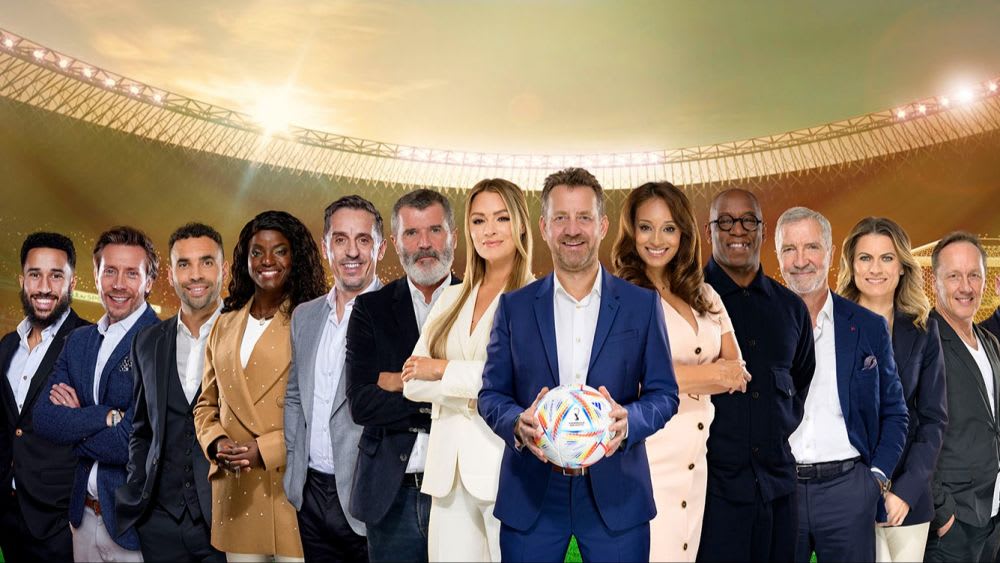
Non-sponsor advertising
The popularity of football and the impact of the World Cup mean that is highly tempting for brands that do not have an official connection with the tournament to advertise around it.
This ‘ambush marketing’ is usually carefully crafted so as not to infringe on the rights of actual sponsors, with, for example, the name of the event excluded from promotional activity.
However, it can still be effective in convincing audiences of an association. Nike, as a kit supplier of multiple teams and players, is effectively compelled to launch a campaign at the time of the World Cup and in a survey at the time of the 2014 tournament 30% of UK, US and Brazilian consumers wrongly named it as an official partner, not far shy of the 36% who identified actual sponsor adidas.
For this year’s competition, the US sportswear giant has rolled out a futuristic advertisement called ‘Footballverse’ featuring current Nike footballers such as Portugal's Cristiano Ronaldo and France's Kylian Mbappé up against representations of Brazilian legends Ronaldinho and Ronaldo as a group of scientists in a laboratory debate who is the best player of all time.
Produced by Wieden + Kennedy Portland, the ad also includes top female players including USA's Alex Morgan and Australia's Sam Kerr, and is accompanied by the 1980s pop song Weird Science.
In the UK, brands taking advantage of the confluence of football and the festive season include retailer Sports Direct, which has released three adverts on TV and social media under the campaign headline ‘Give Me Football’.
The Christmas campaign features current Premier League players who will be at the World Cup in England's Declan Rice and Mason Mount and Brazil's Gabriel Jesus, plus former stars in France's Eric Cantona and Thierry Henry.
Meanwhile, Pringles has launched a TV advert, produced by Grey London, that combines football and festive themes, including a snowman’s head hitting the back of the net, football baubles and Santa holding an air horn. It closes with the message of ‘It’s Pringles season’, stressing the role of the brand as a popular sharing snack for moments of celebration.
Bookmaker Paddy Power, a past master in ambush marketing stunts, has launched a Christmas advertisement with the strapline ‘Where were you in 22?’, which stars former England player Peter Crouch, and recreates memorable moments from previous World Cups.
Other creative marketing initiatives have included Duolingo, the language learning company, sponsoring Qatar FC, not the country but an amateur football team in Rio de Janeiro in Brazil, and launching Fowl Language, a translation tool that enables fans to trash talk in 10 different languages.
While the controversies will have prompted some brands to actively avoid any association with the World Cup, BrewDog, the Scotland-based brewery and pub owner, has gone further in proclaiming itself as an 'anti-sponsor' of the tournament in Qatar, citing the allegations of corruption in the selection of the host and the country’s human rights record and treatment of migrant workers.
The company will still be showing the matches in its pubs, and has pledged to donate net profits from sales of its Lost Lager brand to charity.
However, the campaign has been derided in many quarters as a self-seeking publicity stunt, and BrewDog accused of hypocrisy given the complaints made against the firm by a large number of its employees earlier this year, and a BBC documentary that corroborated claims of a “toxic and misogynistic work culture”.
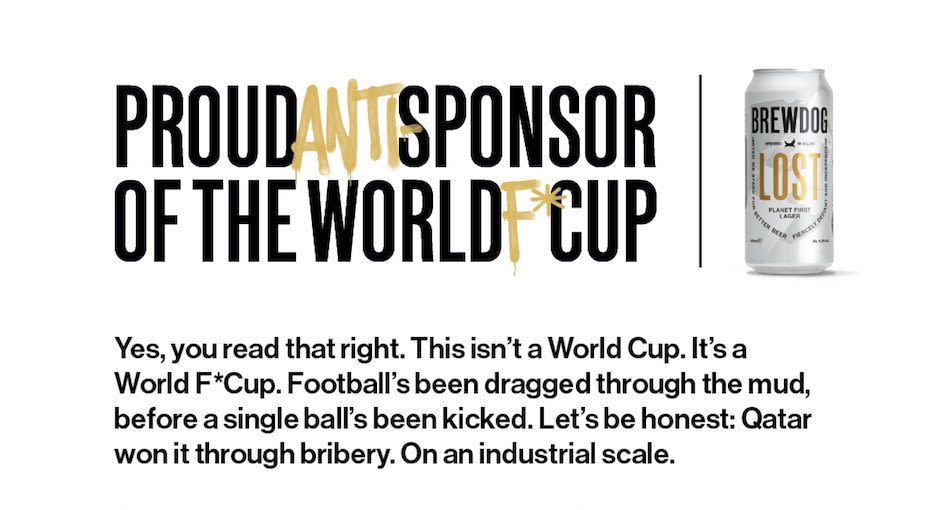
By Simon Ward, Insight Editor
ALF helps you to:
Tailor your approach with news and insight
Understand a brand’s business and challenge
Reach out to all the decision-makers that will be involved
Act instantly. ALF shows you changes and these changes drive opportunities for you
Plan your pipeline. ALF can build you a prospect list that will be best for you
Target your prospects across all channels. Office numbers, email addresses, Twitter accounts, LinkedIn profiles and office address. ALF gives you direct links to all these channels
Do you need an ALF refresher? Call us on +44 (0) 208 102 0907 or get in touch with Head of Customer Success, Michael Kirkham, who will show you how to get the most out of ALF, helping you with your prospecting.




